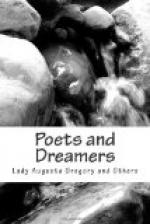Some poems were repeated also: Raftery’s ‘Argument with whiskey,’ in which he puts the joys and sorrows of its lovers only too impartially. Another ‘Argument’ was between two men, herds, I think; each counting up the virtues of his own province, Connaught or Munster. An old man gave a long poem, a recital of Bible history; but the judges rang their bell when he had got to the parable of the Prodigal Son, and was telling how ’the poor foolish boy went away from his home and from his father to some far country’; and he left the platform saying indignantly: ’You might have left me time to bring him back again.’ And there was a poem on ‘The rising again of Ireland,’ telling how, when she has risen, ’ships will be coming to her from France and from Spain, and from all the countries; and there will be no rent on the land; and every poet will be given a fee of twenty-one pounds.’
In the evening there were people waiting round the door to hear the songs and the pipes again. An old man among them was speaking with many gestures, his voice rising, and a crowd gathering about him. ’Tha se beo, tha se beo’—’he is living, he is living,’ I heard him say over and over again. I asked what he was saying, and was told: ’He says that Parnell is alive yet.’ I was pushed away from him by the crowd to where a policeman was looking on. ‘He says that Parnell is alive still,’ I said. ‘There are many say that,’ he answered. ’And, after all, no one ever saw the body that was buried.’
The rising again of Ireland, of her old speech, of her last leader, dreams all, as we are told. But here, on the edge of the world, dreams are real things, and every heart is watching for the opening of one or another grave.
AN CRAOIBHIN’S PLAYS
I hold that the beginning of modern Irish drama was in the winter of 1898, at a school feast at Coole, when Douglas Hyde and Miss Norma Borthwick acted in Irish in a Punch and Judy show; and the delighted children went back to tell their parents what grand curses An Craoibhin had put on the baby and the policeman.
A little time after that, when a play was wanted for our Literary Theatre, Dr. Hyde wrote, and then acted in, ‘The Twisting of the Rope,’ the first Irish play ever given in a Dublin theatre.
It has been acted many times since then, in Dublin, in London, in Galway, in Galway Workhouse, in Cornamona, Ballaghaderreen, Ballymoe, and other places. It has always given great delight, and its success is very natural; for the Irish-speakers, who are its audience, have an inborn love of drama, as is shown by their handing down of such long dramatic dialogues as those between Oisin and St. Patrick, from century to century. At country gatherings, those old dialogues, and the newer ones between Death and Raftery, or between the farmers of two provinces, are followed with a patient joy; and the creation of acting plays is the natural outcome of this living tradition. And Douglas Hyde’s dramas grow directly from the folk-memory. The tradition and the beautiful old air, and the song of ‘The Twisting of the Rope,’ are very well known:—




